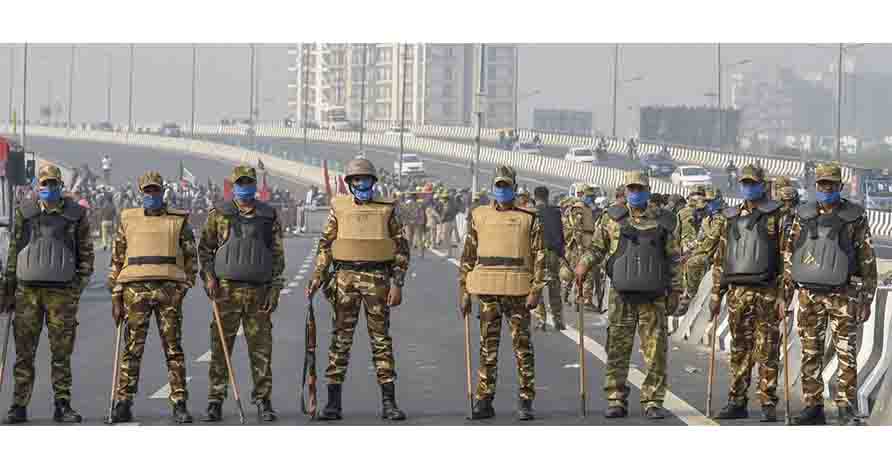Delhi police at Delhi-Meerut Expressway amidst farmer protests, in New Delhi on December 7
The V Dem Institute’s report notes that much of the decline in democratic freedoms occurred after the BJP and Narendra Modi’s victory in 2014.
A Sweden-based institute has said that India is no longer an ‘electoral democracy’, classifying the country as an ‘electoral autocracy’ instead, noting that much of the decline in democratic freedoms occurred after the BJP and Narendra Modi’s victory in 2014.
The V-Dem Institute, an independent research institute based at the University of Gothenburg, has published data-heavy worldwide democracy reports since 2017. In last year’s report, it had observed that India was on the verge of losing its status as a democracy.
This year’s report – based on data from 2020 – has confirmed that suspicion, with V Dem retrospectively classifying India as an ‘electoral autocracy’ from 2019. It said that the classification of India was ‘highly uncertain’ last year because the underlying data was not clear. “But with more and better data this year, India is classified with a higher degree of certainty as an electoral autocracy from 2019,” it said.
With this slide, India has moved from the top 50 per cent of the 180 countries analysed by V Dem to the bottom 50 per cent. In last year’s report, India was last among the 90 countries in the top 50 per cent. This year, it is ranked 97th, falling into the bottom 50 per cent.
India is among the countries leading the ‘third wave of autocratisation’, V Dem said, noting that 68 per cent of the world’s population now lives under autocratic regimes. This year’s report, therefore, is titled ‘Autocratization Turns Viral’.
“This reflects an accelerating wave of autocratisation engulfing 25 nations that hold 1/3 of the world’s population – 2.6 billion people. Several G20 nations such as Brazil, India, Turkey, and the United States of America are part of this drift,” V Dem said.
V Dem says autocratisation “typically follows a similar pattern across very different contexts”. It begins with ruling governments attacking the media and civil society, followed by polarisation of the society by “disrespecting opponents and spreading false information” and culminates in elections being undermined, it says.
The report dedicates a chapter to India, titled ‘Democracy Broken Down: India’. The chapter says that the “world’s largest democracy has turned into an electoral autocracy”. India’s autocratisation process has largely followed the typical pattern for countries in the “third wave” over the past ten years, which is a gradual deterioration where freedom of the media, academia, and civil society were curtailed first and to the greatest extent, the report says.
“Narendra Modi led the Bharatiya Janata Party (BJP) to victory in India’s 2014 elections and most of the decline occurred following BJP’s victory and their promotion of a Hindu-nationalist agenda. India’s level of liberal democracy registered at 0.34 by the end of 2020 after a steep decline since its high at 0.57 in 2013. That represents a 23-percentage point drop on the 0 to 1 LDI [Liberal Democracy Index] scale, making it one of the most dramatic shifts among all countries in the world over the past 10 years,” the report noted.
V Dem said that the sharpest decline was visible in government censorship of the media, repression of civil society organisations and the autonomy of the Election Commission of India. There is a high degree of media bias and a fall in academic and religious freedoms, the report says.
“The Indian government rarely, if ever, used to exercise censorship as evidenced by its score of 3.5 out of 4 before Modi became prime minister. By 2020, this score is close to 1.5 meaning that censorship efforts are becoming routine and no longer even restricted to sensitive (to the government) issues. India is, in this aspect, now as autocratic as is Pakistan, and worse than both its neighbours Bangladesh and Nepal,” V Dem records.
With the Centre giving the nod to the new IT Rules, which give the government sweeping powers, future reports could see India’s media freedom being downgraded further.
It also says there are ‘alarming reports’ of harassment of journalists covering COVID-19 in India. The Wire has previously reported that at least 55 Indian journalists faced police action or threats for reporting on the country’s response to the COVID-19 crisis.
The report has also criticised the government’s use of sedition, defamation and counter-terrorism laws such as the Unlawful Activities (Prevention) Act. “For example, over 7,000 people have been charged with sedition after the BJP assumed power and most of the accused are critics of the ruling party,” it said.
V Dem criticised India’s crackdown on the protests against the Citizenship Amendment Act (CAA), saying the Act itself “arguably” violates the constitution’s prohibition of discrimination by religion. The report also notes that civil society organisations are being “muzzled” in the autocratisation process, specifically through the Foreign Contributions (Regulation) Act, which was amended in September 2020 to “constrain foreign contributions to NGOs within India”.
“These developments are among the instances contributing to the descent into electoral authoritarianism in what used to be the world’s largest democracy,” the chapter on India concludes.
Last year, the Institute had described the BJP as an illiberal party that is comparable to those that are ruling over autocracies. It clubbed the BJP with the Polish Law and Justice Party, Hungarian Fidesz Party and the Turkish Justice and Development Party, saying all of them score high on “illiberalism”.
It said while the BJP has been exhibiting illiberalism since 1999, over the course of the last 20 years, “all four parties have become more and more illiberal. By now, they fare close to the typical ruling party in autocracies in terms of illiberalism”.
The V Dem report comes just days after the US government-funded NGO Freedom House downgraded India from ‘free’ to ‘partly free’ for cracking down on “expressions of dissent by the media, academics, civil society groups, and protesters”. India’s score in the annual Freedom in the World report dropped to 67 in the latest report, a drop from 71.
India’s slide in these reports only mirrors its decline in indices compiled by independent bodies which monitor democratic freedoms over the past few years.
In March last year, Reports Without Borders (RSF) placed India alongside China, Russia, Iran and Saudi Arabia in a list of press freedom’s “worst digital predators”. The list compiled by the global media watchdog flags countries where companies and government agencies use “digital technology to spy on and harass journalists”.
The following month, the US government’s Religious Freedom Monitor recommended that the country’s state department should include India in the list of “countries of special concern”, in the company of China, Pakistan, North Korea, Saudi Arabia and Russia. It noted that religious freedom had improved globally but singled out India for seeing a “sharp downward turn”.

Again in April, India was ranked 142nd out of 180 countries in RSF’s Press Freedom Index, sliding two ranks down. It criticised the ‘longest electronic curfew’ in history in Kashmir and highlighted that ‘state troll armies’ in the country use the ‘weapon of disinformation’ on social media.
The country also fell 26 places to rank 105th among 162 countries and territories on a global economic freedom index released by the Fraser Institute in Canada in September 2020.
In November 2020, an international network of higher education institutions called on authorities in India to “ensure the autonomy and functioning of higher education institutions”. It highlighted “fears that the space for ideas and dialogue in India is being constricted, and dissent punished, endangering scholars and students whose views are disfavoured by the ruling government”.
Finally in December 2020, India was ranked 111th out of 162 countries in the Cato Institute’s Human Freedom Index 2020. The institute gave India a score of 6.43, which is lower than the index’s average human freedom rating of 6.93. Between the 2019 and 2020 indices, the country plummeted 17 spots.
Source: ‘The Wire’, 11 March, 2021







